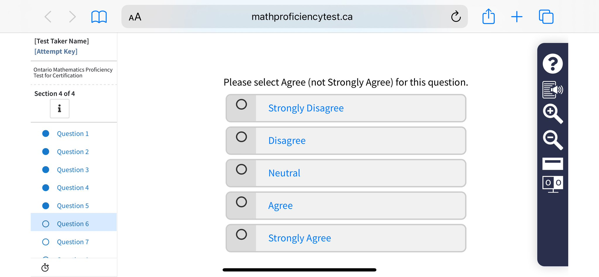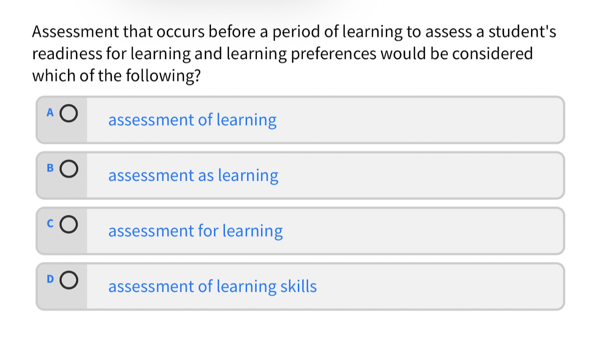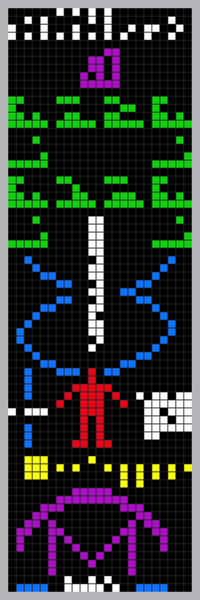Teaching Math in Ontario
Ontario has - well, “had”, because it was just ruled unconstitutional - a Math Proficiency Test for new teachers. Which has been quite a topic of discussion around here, as my daughter is just finishing teachers college, and my future daughter-in-law is currently teaching.
In another version of my life, I thought I’d be a math teacher. I’d be that cool teacher who gets the kids excited about math (and also directs the pep band.)
so I woke up this morning and I thought, you know what would be fun? Why not try the practice test and see what this is all about?
Perhaps this is an odd definition of ‘fun’ but I enjoyed going through the test.
71 questions. 2/3 of them are on math, and 1/3 on pedagogy, and then there’s an optional questionnaire. I believe 70% is a passing grade. For the past year or so, all new teachers were required to pass this, but the future of the test is up in the air at the moment.
plunging ahead
This, believe it or not, is one of the actual questions. (I got this one right, phew.)

What on earth is going on here? Is this an attempt to catch bots, or people who always answer “B” to every question, or a test to see if you’re reading, or was there originally some question that they later decided was inappropriate?
the math part
I did not have much trouble with the math part. Some of the questions let you use a calculator but as a show of mental toughness I decided to try doing all the questions in my head. Got one wrong - dumb arithmetic mistake that I’m sure I would have caught if I used the calculator.
Some of them are unbelievably basic, like (paraphrasing)
In the number 470,253, the digit ‘7’ represents what?
- 70
- 70,000
- 700,000
- 7
Others require you to evaluate a little expression using BEDMAS (“What is 16 - 2 * 3 + 5 * 0”, that kind of thing) which if you’ve been on Facebook any time in the past year, you’ve seen some idiot version of this which has fourteen million wrong answers in the comments.
And at one point I had to pause for a moment to try to recall the formula for the area of a parallelogram - one question showed you a parallelogram, gave the lengths of the sides, and said “if you divided this into two congruent triangles, what would be the area of each” and, well, there’s a button in the test that takes you to page showing all the formulae for things but you know what I REMEMBERED HOW TO DO IT WITHOUT LOOKING IT UP phew.
You could answer a lot of the questions that required calculation by just doing a rough estimate with rounder numbers - can I quickly come up with something that’s within 25% or so of the right answer? - which was often enough to rule out 3 of the 4 choices. This is also a useful skill. You don’t always need to do an exact calculation.
So, good news, I passed the math part with flying colours. I should hope so. I have two degrees in math, which honestly is two more degrees in math than anybody really needs.
the pedagogy part
The last section was pedagogical questions. This sort of thing. (I got this one wrong, I think I mixed up “of” and “for”.)

My daughter commented - Yeah…I mean that question would be very easy for someone who’s taken a pedagogy course…but yeah that’s the level of minutiae.
She’s right, this pedagogy part just seems to ask you to repeat the buzzwords you learned in a course. It’s a test of memorization, not of math and logic.
The first part of the test seems like a pretty reasonable way to evaluate if somebody remembers what they were taught up to about 9th grade math. I think that’s a reasonable thing to ask of all teachers. They’re not asking you to do calculus, they’re just asking you to apply some general principles. I heard it said once that All teachers are teachers of language, and I think you could extend that to basic math numeracy too.
But the pedagogy part. That would really trip up people whose first language isn’t English, for one thing. And what’s it doing in a test about math proficiency?
having said that I am delighted to say I got 17/20 on the pedagogy part with some educated guessing, which is also a useful skill. I’ve been lucky to work in the education division of my employer so I’ve been around teachers for a while.
And Cathy reminds me “Didn’t you actually go to teachers college?”
Well, yeah, I did, for three weeks; I am a proud dropout of York University, after a brief, unsuccessful midlife crisis experiment a while ago.
It turns out some of this is hard.
the questions I hoped it would include
Math is a wonderful thing!
Get off your ath and do some math!
Six times a billion is …?
so should there be a math proficiency test?
Yes. Yes there should. Math is a universal language. It is the foundation of truth, and beauty, and has a standard of proof higher than that in any other field of human endeavour.
When we send satellites out of the solar system, hoping they will some day reach a distant galaxy, we engrave plaques on them with math symbols to prove that we are an advanced species. Prime numbers, in particular, are such a fundamental idea that if you can just list them in some language-independent way, like this -
•• ••• ••••• ••••••• •••••••••••
that that’s a good start at demonstrating where you are. There is no conceivable universe where 7 is not a prime number! We have to agree on that with whatever aliens are out there!
The first radio message beamed out to the stars from the Arecibo Observatory in 1974 was sent as 1,679 binary pulses. Why 1,679? It’s the product of two primes, 73 and 23, and if you can figure that out, you might realize you could arrange the binary pulses into a 23 * 73 graphic like this (colour here added by the Wikipedia article with all the details- but can you see the patterns in there?
There’s a human (red) and a representation of our solar system (in yellow) - notice how the 3rd dot is offset, that’s where this message originated. And more. How much of this can you figure out? Here’s the details.

Isn’t that cool? Yes, yes it is. Math. It’s everything.
But the pedagogy part. That needs some thought. That belongs somewhere else.